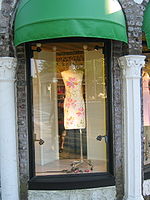Cocktail dress: Difference between revisions
incorporate info from the ref; most of the article is still unsourced |
LeilaLynch (talk | contribs) |
||
| Line 11: | Line 11: | ||
In the mid-20th century, some ''[[haute couture|couturier]]s'' began describing full-skirted cocktail gowns as "dancing costumes". These are suitable for formal dances but not for [[ball (formal dance)|ball]]s, or other [[white tie]] affairs, where [[ball gown]]s are worn. |
In the mid-20th century, some ''[[haute couture|couturier]]s'' began describing full-skirted cocktail gowns as "dancing costumes". These are suitable for formal dances but not for [[ball (formal dance)|ball]]s, or other [[white tie]] affairs, where [[ball gown]]s are worn. |
||
== History == |
|||
Cocktail dress - shortened [[women]]'s clothes for special occasions without a [[collar]] and [[sleeves]]. It appeared in the US during [[Prohibition]]. At that time, a party with drinks was held in private homes or secret bars. At these places [[alcohol]] was served, [[jazz]] was played, and people went there to have fun and [[dating]]. Such events required a particular form of [[smart clothing]]: less [[formal]] and [[elegant]] than evening, but more [[fanciful]] and [[flamboyant]] than [[casual]]. Thus was born the cocktail dress. |
|||
Initially, this dress barely overlapped the [[knees]], was based on latest trends of [[fashion]] and made of expensive, but not [[luxurious]], [[fabrics]]. For cocktail dresses were relied special accessories: small [[purses]], embroidered with [[beads]], in which were placed only cash and a powder-box, open [[shoes]] with straps under the color of [[dress]], long, up to the [[elbow]], [[gloves]]. By 30th year, due to taste and perseverance of [[Coco Chanel]], "[[little black dress]]" - sample cocktail [[attire]] "is always at hand" - has become a permanent part of every woman's wardrobe.<ref>{{cite web |url=http://www.metmuseum.org/toah/hd/coho/hd_coho.htm |title=Dressing for the Cocktail Hour | last1=da Cruz |first1=Elyssa |date=2000 |work=Heilbrunn Timeline of Art History |publisher=New York: The Metropolitan Museum of Art |accessdate=November 13, 2009 }}</ref> |
|||
[[Christian Dior]] was the first to use the term "cocktail dress" to refer to early evening wear, in the late 1940s.<ref>{{cite web |url=http://www.metmuseum.org/toah/hd/coho/hd_coho.htm |title=Dressing for the Cocktail Hour | last1=da Cruz |first1=Elyssa |date=2000 |work=Heilbrunn Timeline of Art History |publisher=New York: The Metropolitan Museum of Art |accessdate=November 13, 2009 }}</ref> |
[[Christian Dior]] was the first to use the term "cocktail dress" to refer to early evening wear, in the late 1940s.<ref>{{cite web |url=http://www.metmuseum.org/toah/hd/coho/hd_coho.htm |title=Dressing for the Cocktail Hour | last1=da Cruz |first1=Elyssa |date=2000 |work=Heilbrunn Timeline of Art History |publisher=New York: The Metropolitan Museum of Art |accessdate=November 13, 2009 }}</ref> |
||
Revision as of 20:14, 5 January 2010
This article needs additional citations for verification. |


A cocktail dress or cocktail gown is a woman's dress worn at cocktail parties, and semi-formal occasions.
The length of cocktail dresses varies depending on fashion and local custom. The length ranges from just above the knee to touching the ankle. When it is about 5 cm (2 inches) above the ankle it is called tea length and when it is almost touching the ankle it is called ballerina length, although ballerina length dresses usually fall into the evening gown category.
At semi-formal occasions, less elaborate, shorter-length cocktail dresses may be worn. Prior to the mid 20th century this type of dress was known as 'late afternoon'. When gentlemen are in business suits, ladies also wear dress suits or "good" afternoon skirt and dresses.
By the 1980s a dress was considered to be cocktail less by where the hem fell, but more by the level of sumptuousness the garment attained.
In the mid-20th century, some couturiers began describing full-skirted cocktail gowns as "dancing costumes". These are suitable for formal dances but not for balls, or other white tie affairs, where ball gowns are worn.
History
Cocktail dress - shortened women's clothes for special occasions without a collar and sleeves. It appeared in the US during Prohibition. At that time, a party with drinks was held in private homes or secret bars. At these places alcohol was served, jazz was played, and people went there to have fun and dating. Such events required a particular form of smart clothing: less formal and elegant than evening, but more fanciful and flamboyant than casual. Thus was born the cocktail dress.
Initially, this dress barely overlapped the knees, was based on latest trends of fashion and made of expensive, but not luxurious, fabrics. For cocktail dresses were relied special accessories: small purses, embroidered with beads, in which were placed only cash and a powder-box, open shoes with straps under the color of dress, long, up to the elbow, gloves. By 30th year, due to taste and perseverance of Coco Chanel, "little black dress" - sample cocktail attire "is always at hand" - has become a permanent part of every woman's wardrobe.[1]
Christian Dior was the first to use the term "cocktail dress" to refer to early evening wear, in the late 1940s.[2]
See also
References
- ^ da Cruz, Elyssa (2000). "Dressing for the Cocktail Hour". Heilbrunn Timeline of Art History. New York: The Metropolitan Museum of Art. Retrieved November 13, 2009.
- ^ da Cruz, Elyssa (2000). "Dressing for the Cocktail Hour". Heilbrunn Timeline of Art History. New York: The Metropolitan Museum of Art. Retrieved November 13, 2009.
